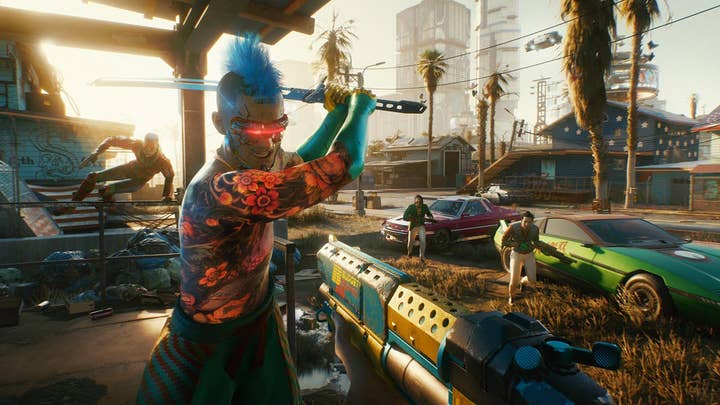2020: Games boomed, but the industry was treading water | Opinion
The impact of the pandemic was less severe than many feared, and new consoles launched on schedule -- but there are plenty of open questions for 2021
As we approach the end of 2020 and enter the inevitable season of both retrospectives and speculative looks at the year to come, I figured it might be helpful to look back at some of what I and others wrote in that vein in our retrospectives at the end of 2019 -- not least since my brain informs me, and I see no reason to doubt it, that this occurred some 30-odd years ago. I opened those articles with a little trepidation, because, well, how could they not have been proven to be absolute folly, to the point of ridiculousness, by the bizarre and unprecedented year we've all had?
For all that the end of last year really does seem very, very long ago, it turns out that many of those articles aren't as outdated as I'd feared. In fact, reading commentators' expectations for 2020, my own included, in light of the actual events of the year turns out to be somewhat reassuring; for all the disruption thrown in front of us this year, most of the major developments we expected for the year pretty much happened as planned.
Nintendo had a banner year for the Switch... It's notable that its fantastic sales came in spite of a pretty bare release schedule
Perhaps the biggest thing of all, of course, is that Microsoft and Sony, whose divergent strategies were being well-trailed by the end of last year, both launched their new consoles as intended, each of them having executed a solid, competent pre-launch strategy that's left us with two very viable and attractive next-gen platforms on the market. Nintendo, meanwhile, had a banner year for the Switch, which continues to sell like gangbusters; right now it's possible that it's getting a Christmas boost from the lack of availability of rival next-gen hardware, but honestly, it's carved such a unique furrow for itself so far that it's entirely possible that it'd be selling just as well even if you could walk into a shop and buy a PS5 easily.
COVID-19 did leave its mark on each of those companies and their platforms, of course; supply chain issues left Nintendo struggling to keep up with demand for much of the year, while the constrained availability of next-gen consoles -- and of NVIDIA's much-in-demand new graphics cards -- may also owe, in part, to knock-on effects from the pandemic. While most of the year's major software titles did make it out the door -- though in the case of Cyberpunk 2077, at least, a while longer in the oven would clearly have done no harm -- it's still notable that Nintendo's fantastic sales came in spite of a pretty bare release schedule, and that neither Series S|X nor PS5 had quite the strong opening salvo they might have hoped for. PS5 edges that contest somewhat, but it's still resting very heavily on the promise of 2021.

Perhaps the biggest impact of COVID on the new hardware launches, though, lay in pushing the entire process online. While hardware launches have been marred by scalpers and profiteering before, the lack of any physical retail sales for these systems has turned that into a bigger problem than we've seen previously. Most online retailers failed to put into place any kind of system to counteract the use of bots to corner the market for the new consoles and graphics cards, allowing scalpers to snap up huge amounts of stock; some retailers even cheerfully allowed the scalpers to advertise their grotesquely marked-up stock on the same platform.
More than any other issue, this marred the new console launches. While Sony and Microsoft won't do this dance again for quite some time, companies which regularly release highly desired products like NVIDIA and AMD would likely do well to work closely with their partners to try and prevent a reoccurrence.
The wind continues to turn against the loot box monetisation model, but legislators were largely busy with other things this year
Something else that leaps out when reading last year's forward-looking pieces, though, is that many of the other areas where we expected to see major progress in 2020 remained somewhat stalled. Perhaps the pandemic played a role in this, too, but it certainly felt like the VR space didn't get the shots in the arm we might have expected from the arrival of both a truly impressive high-profile game like Half-Life: Alyx and a genuinely great standalone headset in the form of the Oculus Quest 2.
It doesn't help, I suppose, that the former isn't playable on the latter; VR really, really needs to fix its fragmentation problem, and in a way that doesn't involve asking users to muck around with hacky bits of third-party software. AR, meanwhile, went largely nowhere this year -- perhaps unsurprising since Magic Leap's consumer offering went down the tubes and the world largely seems to be expecting Apple to come along and pick up the pieces in the next year or two.
The refocusing of industry and government attention on the COVID-19 crisis and the enormous changes it created for work practices also severely limited progress in many other areas related to the games business. The wind continues to turn against the loot box monetisation model, but legislators were largely busy with other things this year -- perhaps offering the industry a little breathing room to pull back from some of the more avaricious practices that crept into this kind of mechanism, and if they're fast, smart and lucky, to avoid almost inevitably overreaching legislation of their business practices.

For UK developers, meanwhile, the shadow of Brexit hasn't gone away by any means -- indeed, within a matter of days it's likely that a No Deal scenario will come to pass, which will have major implications for a lot of different aspects of how game-related firms do business in the UK -- but it also seemed frozen in the sky for much of the year as negotiations stalled for months on end. One concern I've heard several times is that studios in the UK have been firefighting the impact of COVID in a year when they should have been making strenuous preparations for the change in their operating environment that's about to hit, so the impact will be all the greater for the lack of focus over the past nine months or so.
It's nice to recognise that the fun, artistry and escapism of games meant such a great deal to a lot of people during a long, tough year
The aforementioned change to work practices, meanwhile, is likely to be a major ongoing impact of COVID that far outlasts the pandemic itself. After the year we've had, any kind of crystal ball gazing seems like a pretty fraught enterprise -- my predictions will look pretty silly once the aliens have invaded or the asteroid has hit or whatever the hell else 2021 intends to slap us about the face with has occurred -- but all things being equal, it seems that the coming year is probably going to see a fairly major tug-of-war over what the "new normal" for our industry actually looks like.
As vaccinations become widespread and the possibility of in-person work returns, companies are going to have to ask tough questions about exactly what impact the measures adopted during the crisis have had on different parts of their business -- while many staff are likely to fight hard to retain the freedom to work remotely that's been forced upon firms by the pandemic. At first, at least, it seems inevitable that we'll end up with a patchwork of different practices and solutions, with different companies reaching very different conclusions depending on what aspects of work, productivity and studio culture they consider most valuable.
The new normal that settles out of this won't just be a simple remix of the old normal, but it might not be quite as radical a departure as some people are hoping nonetheless. The fight over that is likely to be one that leads to some major industry upheaval in the coming years.
While the myth of the "recession-proof" games industry is long behind us -- and the likelihood of a serious consumer-led recession gripping as the pandemic progresses remains a real one, though the industry has largely dodged its effects thus far -- it's certainly the case that 2020, for all its hardships and upheavals, was a pretty solid year for games. At their core, games are a kind of entertainment that plenty of people, myself included, found themselves valuing more than ever this year; we should perhaps not be surprised that as I write this, Nintendo and Sony have both just closed out a day's trading at share price heights they haven't seen in well over a decade.
Like many other firms to soar during the pandemic, they offer something people have found real value in during this tough year. For all the criticism and arguments and problems that surround this industry and its creations, it's nice to recognise that the fun, artistry and escapism of games meant such a great deal to a lot of people during a long, tough and mentally exhausting year.
Whatever next year brings, video games, in their own small way, helped to make 2020 that little bit more tolerable for a great many of us.

